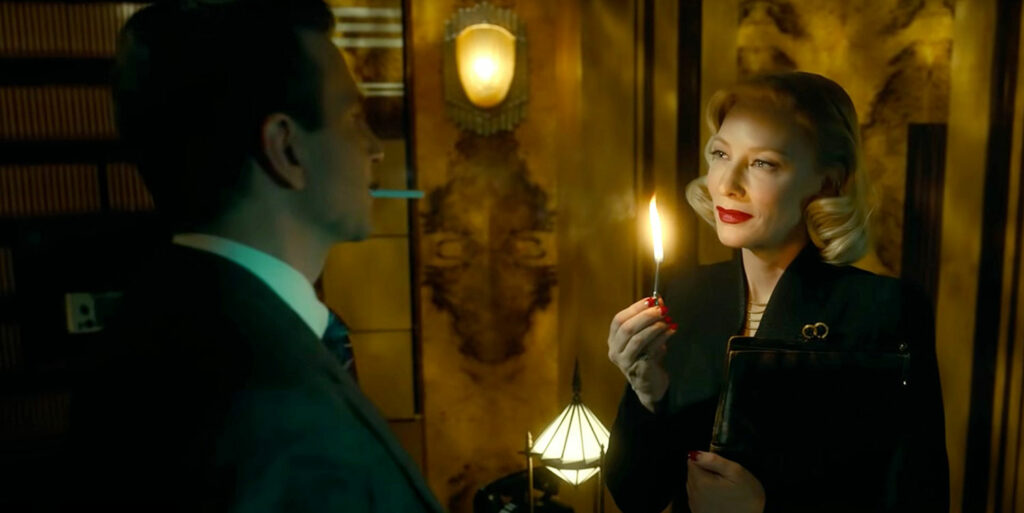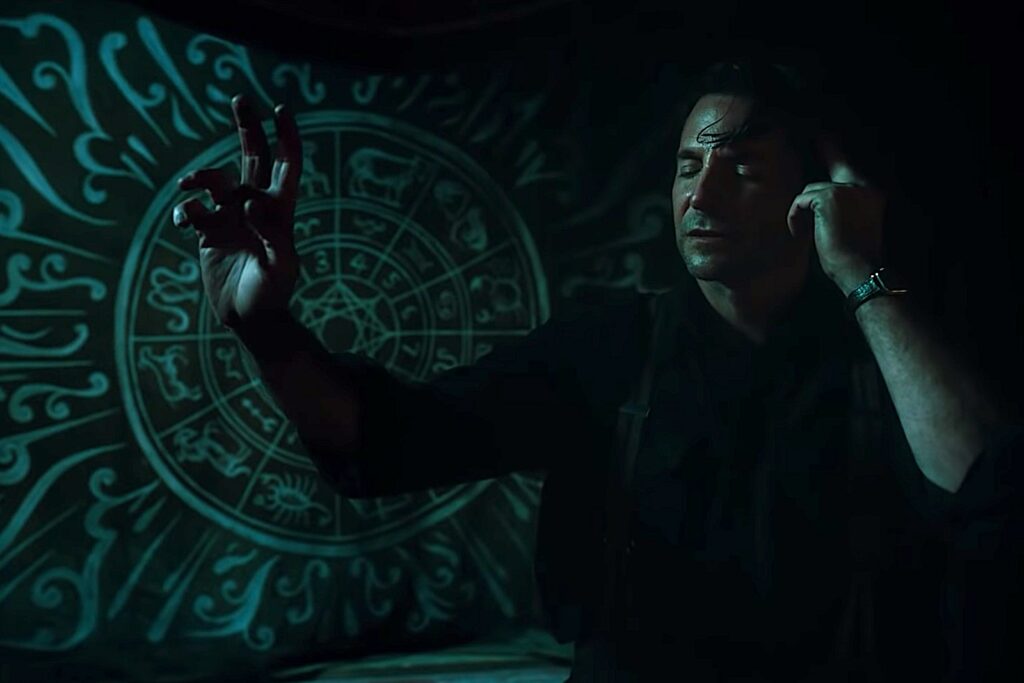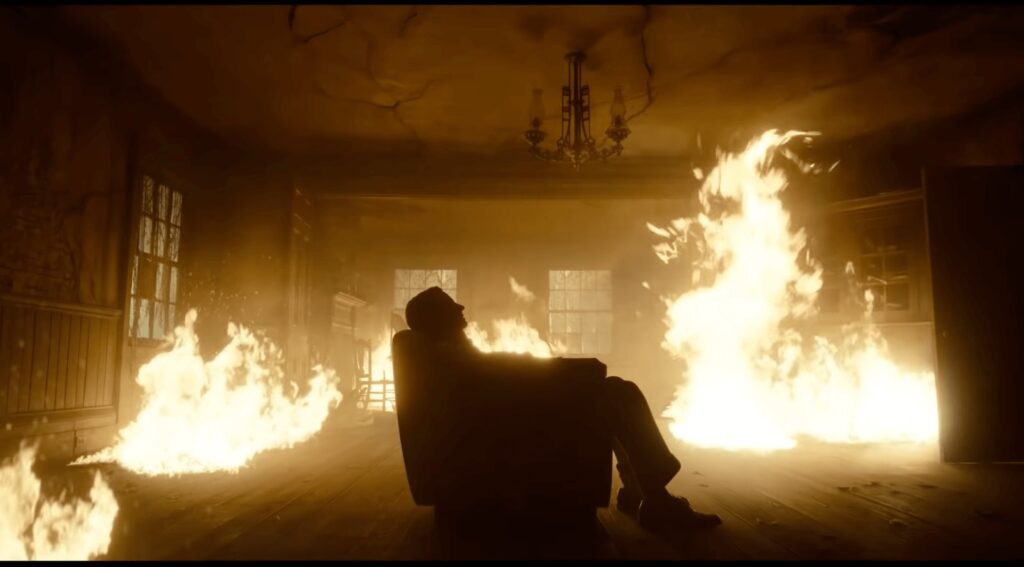Soon after Nightmare Alley’s infernal opening, Bradley Cooper’s Stanton Carlisle finds himself in a house of horrors, hunting down the wretched figure of the carnival’s repulsive ‘geek’. The usual twinkling lights and spinning corridors of the travelling attraction are eerily absent, replaced instead by flashes of lightning and the drum of heavy rain on canvas.
Daubed on one wall are the seven deadly sins: pride, greed, wrath, envy, lust, gluttony and sloth. Unfortunately for our protagonist, Carlisle sees this less as a warning than a checklist; when the geek attacks him, he responds in kind. “You’ll kill him!” Willem Dafoe’s Clem cries, rushing to his charge’s aid. Wrath, tick.

Sin is a concept Guillermo del Toro returns to again and again in his re-adaptation of William Lindsay Gresham’s 1946 novel, in a film which is refreshingly unafraid to pass judgement on its protagonist’s startlingly skewed moral compass. With a camera planted firmly in the gutter, the director doesn’t hold back in communicating his disdain for Carlisle’s activities. He is a man seen from the perspective of rats and other vermin; constantly in motion, as if ready to pull him down at a moment’s notice.
In a cultural moment far more interested in shades of grey than moral black and white, Nightmare Alley takes pleasure in examining an older, unequivocal interpretation of morality. Our hero’s crimes are traditional, inexcusable to everyone, it seems, but him. He lies, cheats and murders his way to the top and back down again. His sins are the scary, Old Testament kind, the sort that seem likely to get you smote from a mountaintop. Del Toro appears uninterested in painting Carlisle in much other than absolutes: there are no victimless crimes, no worthy motivations. Everything Stanton does is born out of ambition and pride – the latter of which, lest we forget, is a cardinal sin.

Yet for a man introduced to us in flame, attempting rebirth through the purge of an old life, it’s tempting to see Carlisle’s fate as a tragic inevitability, more the victim of a Greek tragedy than the thoughtless hero of a cautionary fairy tale. Certainly, his curiosity, his ambition and his ultimate ruthlessness are the traits of a character striving to escape his determined path.
Indeed, what is arguably his first step on the road to eventual damnation occurs when he plans to leave the carnival, after accidentally poisoning his mentor Pete (David Strathairn). His first instinct in every situation is to escape – afraid, perhaps, of what he knows himself to be capable of. Not that he’d admit it, of course. When Toni Collette’s Zeena reads misfortune in his future, he laughs and turns around her cards. He’s a psychic on the make, after all. He has no time for superstition.
But contrary to Matt Reeves’ superhero-thriller The Batman, another recent film noir, in Nightmare Alley sin comes from within. Where Reeves’ Gotham City, with its oppressively gothic architecture and an establishment riddled with corruption, pressures its residents to greater acts of immorality, Del Toro’s vision of ’40s America strives time and again for the opposite. At every turn, Carlisle is presented with ways to escape: friends and family at the carnival; a relationship with Rooney Mara’s Molly; a successful career as a spiritualist. Yet at every fork in the road his ambition gets the better of him, driving him onwards to greater and greater levels of depravity as the fierce winds marking each decision rail against his moral decline.

The result, then, is a film with something of a moral contradiction at its heart. It judges Carlisle for his sins in one breath while lamenting their ultimate inevitability in the next. It’s this very juxtaposition which makes this hero’s journey so compelling to watch. By the end, there’s a sense that this poor, lonely figure, while objectively hateful in many respects, is as much a victim of fate as the geek he found in a cage all those years ago. He can’t help but inspire sympathy because for all of his flaws, he remains painfully, recognisably human. And that’s a realisation more disturbing than any of the horrors seen at the carnival.
In Nightmare Alley’s chilling final moments, Cooper’s character, homeless and crippled by alcohol addiction, is offered the role of a travelling geek by an exploitative carnie. Finally accepting his fate, Carlisle begins to laugh. He looks at his saviour, eyes filling with tears, and breaths: “I was born for it.”
Though his sins are his own, our hero reflects the moral casualties of the American Dream, brought down by ambition, by pride and by an innate desire to stay on top. A Greek tragedy by way of Medieval Christianity, Nightmare Alley may look like a typical film noir, but behind the curtain lurks something far older and more sinister than its 1940s setting would suggest.
Nightmare Alley arrives on Disney+ 16 March.
